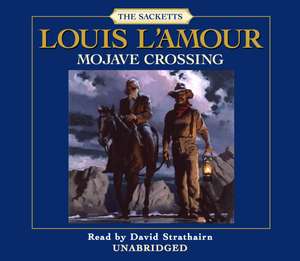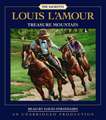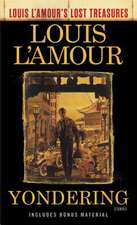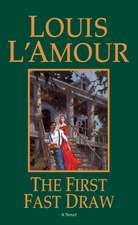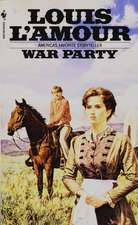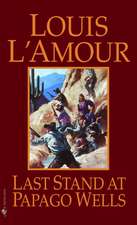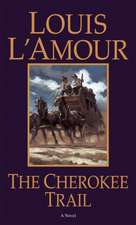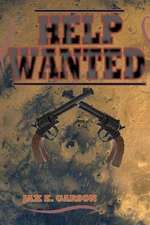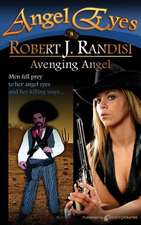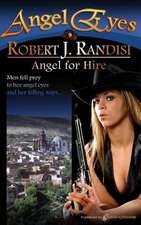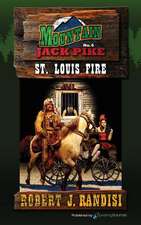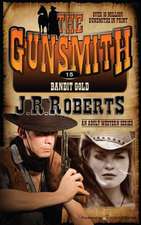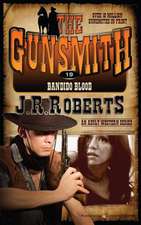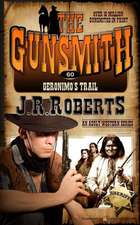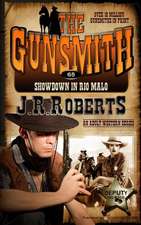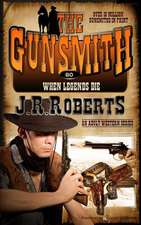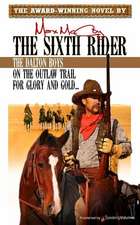Mojave Crossing: Sacketts (Audio)
Autor Louis L'Amour David Strathairnen Limba Engleză CD-Audio – 31 aug 2006
Tell Sackett was no ladies’ man, but he could spot trouble easily enough. And Dorinda Robiseau was the kind of trouble he wanted to avoid at any time—even more so when he had thirty pounds of gold in his saddlebags and a long way to travel. But when she begged him for safe passage to Los Angeles, Sackett reluctantly agreed. Now he’s on a perilous journey through the most brutal desert on the continent, traveling with a companion he doesn’t trust . . . and headed for a confrontation with a deadly gunman who also bears the name of Sackett.
From the Paperback edition.
Preț: 110.04 lei
Nou
Puncte Express: 165
Preț estimativ în valută:
21.06€ • 22.94$ • 17.74£
21.06€ • 22.94$ • 17.74£
Disponibilitate incertă
Doresc să fiu notificat când acest titlu va fi disponibil:
Se trimite...
Preluare comenzi: 021 569.72.76
Specificații
ISBN-13: 9780739321157
ISBN-10: 0739321153
Pagini: 4
Dimensiuni: 124 x 151 x 25 mm
Greutate: 0.2 kg
Ediția:Completă
Editura: Random House Audio Publishing Group
Seria Sacketts (Audio)
ISBN-10: 0739321153
Pagini: 4
Dimensiuni: 124 x 151 x 25 mm
Greutate: 0.2 kg
Ediția:Completă
Editura: Random House Audio Publishing Group
Seria Sacketts (Audio)
Notă biografică
L Louis L’Amour is undoubtedly the bestselling frontier novelist of all time. He is the only American-born author in history to receive both the Presidential Medal of Freedom, and the Congressional Gold Medal in honor of his life's work. He has published ninety novels; twenty-seven short-story collections; two works of nonfiction; a memoir, Education of a Wandering Man; and a volume of poetry, Smoke from This Altar. There are more than 300 million copies of his books in print worldwide.
From the Paperback edition.
From the Paperback edition.
Extras
Chapter One
When I saw that black-eyed woman a-looking at me I wished I had a Bible.
There I was, a big raw-boned mountain boy, rougher than a cob and standing six feet three inches in my socks, with hands and shoulders fit to wrassle mustang broncs or ornery steers, but no hand with womenfolks.
Nobody ever claimed that I was anything but a homely man, but it was me she was looking at in that special way she had.
Where we Sacketts come from in the high-up mountains of Tennessee, it is a known thing that if you sleep with a Bible under your pillow it will keep you safe from witches. Before they can do aught to harm you they must count every word in the Bible, and they just naturally can't finish that before daybreak, when they lose their power to hurt.
Yet when I taken a second look at that black-eyed, black-haired woman I thought maybe it was me should do the counting. She was medium tall, with a way about her that set a man to thinking thoughts best kept to himself. She had the clearest, creamiest skin you ever did see, and a mouth that fairly prickled the hair on the back of your neck.
Most of my years I'd spent shying around in the mountains or out on the prairie lands, with no chance to deal myself any high cards in society, but believe me, there's more snares in a woman's long lashes than in all the creek bottoms of Tennessee. Every time I taken my eyes from that black-haired witch woman it was in me to look back.
My right boot-toe was nudging the saddlebags at my feet, warning me I'd no call to take up with any woman, for there were thirty pounds of gold in those bags, not all of it mine.
The worst of it was, I figured things were already shaping for trouble. Three days hard-running I'd seen dust hanging over my back trail like maybe there was somebody back there who wanted to keep close to me without actually catching up. And that could only mean that trouble lay ahead.
Now, I'm no man who's a stranger to difficulty. No boy who walked out of Tennessee to fight for the Union was likely to be, to say nothing of all that had happened since. Seemed like trouble dogged my tracks wherever I put a foot down, and here was I, heading into strange country, running into a black-eyed woman.
She sat alone and ate alone, so obviously a lady that nobody made a move to approach her. This was a rough place in rough times, but a body would have thought she was setting up to table in Delmonico's or one of those fancy eastern places, her paying no mind to anything or anybody. Except, occasionally, me.
She wasn't all frills and fuss like a fancy woman, for she was dressed simple, but her clothes were made from rich goods. Everything about her warned me I'd best tuck in my tail and skedaddle out of there whilst I was able, for trouble doesn't abide only with fancy women. Even a good woman, with her ways and notions, can cause a man more trouble than he can shoot his way out of, and I'd an idea this here was no good woman.
Trouble was, there just was no place to run to.
Hardyville was little else but a saloon, a supply store, and a hotel at the crossing of the Colorado. Most of the year it was the head of navigation on the river, but there had been a time or two when steamboats had gone on up to the mines in Eldorado Canyon, or even to Callville.
Come daybreak, I figured to cross the river on the first ferry and take out for the Bradshaw Road and Los Angeles, near the western ocean. It was talked among the Arizona towns that speculators out there would pay eighteen, maybe twenty dollars an ounce for gold, whilst in the mining camps a body could get but sixteen.
It was in my mind to sell my gold in Los Angeles, buy goods and mules, pack across the Mojave Desert and the Colorado, and sell my goods in the mining towns. With luck I'd show profit on my gold, and on my goods as well.
Nobody ever claimed I was any kind of a businessman, least of all me, but if a body can buy cheap and sell high he just naturally ain't liable to starve. Of course, in all things there was a reason, and in this case it was the difficulty of getting either gold or goods through a country full up with outlaws and Indians. Whilst no businessman, I was pretty fair at getting from here to yonder, so I just bowed my neck and plunged in, figuring wherever a body could go a Smoky Mountain Sackett could go.
Speaking rightly, there were three kinds of Sacketts in Tennessee. The Smoky Mountain Sacketts, the Cumberland Gap Sacketts, and the Clinch Mountain Sacketts. These here last ones, they were a mean outfit and we had no truck with them unless at feuding time, when we were always pleased to have them on our side, for they were mean men in any kind of a shindig. But most of the time we held off from those Clinch Mountain boys.
There were some lowland Sacketts, too, living in the Cumberland Valley, but they were rich Sacketts and we paid them no mind. Pa, he always said we shouldn't hold it against them if they had money; chances were they couldn't he'p it, no ways.
All the Sacketts, even those no-account Sacketts from Clinch Mountain, run to boy-children. They had a saying over yonder that if you flung a stone into the brush you'd hit a Sackett boy, and likely, although it wasn't said, a Trelawney girl. I don't know what we Sackett boys would have done without the Trelawney girls.
But the only thing I was thinking of now was getting my old saddlebags across the Mojave and to Los Angeles, selling as well as I could, buying as cheap as possible, and getting back to the mines.
Now, when a beautiful woman or a handsome man receives attention it is taken as a matter of course; but I was a plain man, so when this black-eyed woman started paying me mind, I checked my hole card.
Not that I'd lacked for attention where women were concerned... not, at least, after they came to know me. Nor could it be said that I was downright distrustful of folks. There's a-plenty of just people in the world, but the flesh is weak and man is prone to sin... especially if a woman is involved.
But I was packing gold, and it came upon me to realize there is something about the presence of gold that is favorable to the breathing of beautiful women. And likely this woman, with her witch-black eyes, could see right through the leather of my saddlebags.
Only I'd been storing up pleasure for myself in thinking of a time when I could set up to table and eat a hot meal I hadn't fixed for myself, and sleep in a bed, if only for the strangeness of it. And if I high-tailed it out of here now I'd miss both.
For the life of me I couldn't imagine what a woman like this was doing in Hardyville. By the looks of her, she had come upriver on a steamboat, for her clothes showed no dust, as they would had she come by stage or wagon.
When the waitress brought my food the black-eyed woman stopped her, and asked, "Isn't it time for the stage for Los Angeles?"
"Have to get them a new stage," I said.
"What do you mean?"
"It ain't a-comin' in."
All of them were looking at me now, so I said, "Seen it back yonder." I was buttering a thick slab of bread. "He who was driving is dead... two holes alongside his spine. The stage is laying over in the canyon and the horses gone. Two other dead men... passengers."
"Are you sure?" This was Hardy asking.
"The buzzards were."
"You didn't go down to them?"
"Not for more'n a minute or two. No tellin' who was laying up in the rocks with a Winchester."
"Mojaves," somebody said, "or Hualapais."
"They wore moccasins, all right, but they weren't Indians. They were Comanche moccasins, and there's no Comanches out here."
Everybody started talking all to once and I set to eating, glad to be let alone. Anyway, it was likely I'd already talked too much. One of those men who'd done the shooting might be right here in this room, although I'd cast eyes about for moccasins when I first came in, habit-like. Seems to me a man has trouble enough in this world without borrowing more with careless words.
That black-eyed woman was talking to the waitress. "But if that stage has been wrecked, how long will it be before there's another?"
"Ma'am, you'll just have to abide. The next regular stage is Thursday."
This here was Monday, and I could see from that woman's face that she had to be shut of Hardyville long before that. And it wasn't just that this was a jumping-off place—she was scared.
That witch woman's lips turned pale and her black eyes grew large, like she'd seen a ghost. Maybe her own.
She turned sharp around to me and said, "Will you take me to Los Angeles with you?"
And me, like a damned fool, and without thinking, I said, "Yes."
It never does any good for a man to cuss himself, unless maybe it helps to impress on his mind what a fool he's been, but right then and there I did a fair to middling job of cussing myself out for seven kinds of a fool. Here I was, in a running hurry to get to California—to Los Angeles, that is—and I'd burdened myself with a woman. And by the look of her she'd need coddling.
Well, I'd been fool enough for one day, and maybe I could get out of this yet. "You'll need horses," I said. "Are you packing much gear?"
"My trunk can come by stage. All I'll need will be the two carpetbags."
"My pack horse can handle them if they aren't heavy," I said, "but you'll need two ridin' horses. This here's a fast trip I'm makin'."
"Thank you," she said. "If you will get them for me, I'll pay you in Los Angeles. All I have"—she smiled beautifully—"is my stage ticket and a bank draft too large to cash here."
"I—" I started to object that I didn't have the money, but those saddlebags were pushing at my toe and I'd a sneaking feeling—with no reason for it that I could make sense out of—that she knew what was in those bags.
"All right," I said, and lost my last chance to back out of it.
No getting around it, I was upset. It was my notion to make a fast trip to Los Angeles, which was my reason for two horses, switching from one to the other. Now I had that woman to care for, and no telling what she was like on a horse.
Taking another fill of coffee from the pot on the table, I happened to look across at the bar. A man standing there was looking my way and listening to two others. There seemed to be something familiar about the biggest of them. He was a man as tall as I was, and some heavier. He was a dark, strong-looking man who wore a gun like a man who could use it. His back was to me, and he had a fine set of shoulders on him... he was built like a man who could punch.
That woman hadn't moved, and our tables were only two feet apart. Best thing was to get it settled right off.
"If you ride with me," I said, and I'm afraid my tone was kind of rough, "you will be ready to go, come daybreak... and that doesn't mean sun-up. It means the first gray in the sky."
Shoving back my chair, I got up. "Can you use a gun?"
Well, sir, she surprised me. "Yes," she said, "I can handle a rifle." And then she smiled at me, and you've never seen such a smile. "And please do not disturb yourself. I shall be no trouble to you."
Fishing those saddlebags off the floor with my left hand, I stood up, dropping a quarter on the table for my meal. Then I taken up my Winchester with my right hand and walked to the door.
A voice spoke behind me, and I had a feeling the big man had turned to look, and I knew that voice was an invitation to turn around, an invitation to trouble. Stepping outside, I closed the door behind me and stood alone in the soft desert night.
It was very still. The Colorado River rustled by out there in the darkness, and beyond the river loomed the Dead Mountains. Over there a narrow point of Nevada came down to join borders with California.
Uneasily, I looked westward into those miles of desert, and the hunch rode my shoulders that I'd see blood and grief before those miles were behind me. A fool I was to entangle myself with that black-eyed woman.
Of a sudden I realized the thing I'd ought to do was to leave now. True, the ferry was not operating, but swimming the river at this point was no new thing. Beale had done it with his camels, and fine swimmers they proved to be.
There was a light in the window of Hardy's cabin. Crossing to it, I tapped on the door, not too loud.
Being a wise man, he spoke before opening the door, but when I told I wanted to make a dicker on some horses, he opened up, but he held a pistol in his hand, which surprised me none at all.
"Yes," he replied, when I had explained myself. "I've two good horses, but they'll cost you."
He slid his gun into its holster and picked up his coat. He started to put it on, then stopped and looked over at me. "Are you taking that Robiseau woman out of here?"
"I never asked her name, nor she mine. She wishes to go to Los Angeles, and I'm riding that way."
He shrugged into his coat. "You're borrowing trouble. Look, I don't know you. You just drifted in here out of nowhere, but that woman is running from something, and whatever it is or whoever it is will bundle you into her package. I mean, they'll resent interference."
"Whatever it is," I said, "she's a woman alone, and needs help."
He didn't say any more, but led the way to the stable and lighted a lantern. The horses in their stalls rolled their eyes at me. There were only a few stalls, for his own good stock. The mustang stuff was in the corrals out back.
From the Paperback edition.
When I saw that black-eyed woman a-looking at me I wished I had a Bible.
There I was, a big raw-boned mountain boy, rougher than a cob and standing six feet three inches in my socks, with hands and shoulders fit to wrassle mustang broncs or ornery steers, but no hand with womenfolks.
Nobody ever claimed that I was anything but a homely man, but it was me she was looking at in that special way she had.
Where we Sacketts come from in the high-up mountains of Tennessee, it is a known thing that if you sleep with a Bible under your pillow it will keep you safe from witches. Before they can do aught to harm you they must count every word in the Bible, and they just naturally can't finish that before daybreak, when they lose their power to hurt.
Yet when I taken a second look at that black-eyed, black-haired woman I thought maybe it was me should do the counting. She was medium tall, with a way about her that set a man to thinking thoughts best kept to himself. She had the clearest, creamiest skin you ever did see, and a mouth that fairly prickled the hair on the back of your neck.
Most of my years I'd spent shying around in the mountains or out on the prairie lands, with no chance to deal myself any high cards in society, but believe me, there's more snares in a woman's long lashes than in all the creek bottoms of Tennessee. Every time I taken my eyes from that black-haired witch woman it was in me to look back.
My right boot-toe was nudging the saddlebags at my feet, warning me I'd no call to take up with any woman, for there were thirty pounds of gold in those bags, not all of it mine.
The worst of it was, I figured things were already shaping for trouble. Three days hard-running I'd seen dust hanging over my back trail like maybe there was somebody back there who wanted to keep close to me without actually catching up. And that could only mean that trouble lay ahead.
Now, I'm no man who's a stranger to difficulty. No boy who walked out of Tennessee to fight for the Union was likely to be, to say nothing of all that had happened since. Seemed like trouble dogged my tracks wherever I put a foot down, and here was I, heading into strange country, running into a black-eyed woman.
She sat alone and ate alone, so obviously a lady that nobody made a move to approach her. This was a rough place in rough times, but a body would have thought she was setting up to table in Delmonico's or one of those fancy eastern places, her paying no mind to anything or anybody. Except, occasionally, me.
She wasn't all frills and fuss like a fancy woman, for she was dressed simple, but her clothes were made from rich goods. Everything about her warned me I'd best tuck in my tail and skedaddle out of there whilst I was able, for trouble doesn't abide only with fancy women. Even a good woman, with her ways and notions, can cause a man more trouble than he can shoot his way out of, and I'd an idea this here was no good woman.
Trouble was, there just was no place to run to.
Hardyville was little else but a saloon, a supply store, and a hotel at the crossing of the Colorado. Most of the year it was the head of navigation on the river, but there had been a time or two when steamboats had gone on up to the mines in Eldorado Canyon, or even to Callville.
Come daybreak, I figured to cross the river on the first ferry and take out for the Bradshaw Road and Los Angeles, near the western ocean. It was talked among the Arizona towns that speculators out there would pay eighteen, maybe twenty dollars an ounce for gold, whilst in the mining camps a body could get but sixteen.
It was in my mind to sell my gold in Los Angeles, buy goods and mules, pack across the Mojave Desert and the Colorado, and sell my goods in the mining towns. With luck I'd show profit on my gold, and on my goods as well.
Nobody ever claimed I was any kind of a businessman, least of all me, but if a body can buy cheap and sell high he just naturally ain't liable to starve. Of course, in all things there was a reason, and in this case it was the difficulty of getting either gold or goods through a country full up with outlaws and Indians. Whilst no businessman, I was pretty fair at getting from here to yonder, so I just bowed my neck and plunged in, figuring wherever a body could go a Smoky Mountain Sackett could go.
Speaking rightly, there were three kinds of Sacketts in Tennessee. The Smoky Mountain Sacketts, the Cumberland Gap Sacketts, and the Clinch Mountain Sacketts. These here last ones, they were a mean outfit and we had no truck with them unless at feuding time, when we were always pleased to have them on our side, for they were mean men in any kind of a shindig. But most of the time we held off from those Clinch Mountain boys.
There were some lowland Sacketts, too, living in the Cumberland Valley, but they were rich Sacketts and we paid them no mind. Pa, he always said we shouldn't hold it against them if they had money; chances were they couldn't he'p it, no ways.
All the Sacketts, even those no-account Sacketts from Clinch Mountain, run to boy-children. They had a saying over yonder that if you flung a stone into the brush you'd hit a Sackett boy, and likely, although it wasn't said, a Trelawney girl. I don't know what we Sackett boys would have done without the Trelawney girls.
But the only thing I was thinking of now was getting my old saddlebags across the Mojave and to Los Angeles, selling as well as I could, buying as cheap as possible, and getting back to the mines.
Now, when a beautiful woman or a handsome man receives attention it is taken as a matter of course; but I was a plain man, so when this black-eyed woman started paying me mind, I checked my hole card.
Not that I'd lacked for attention where women were concerned... not, at least, after they came to know me. Nor could it be said that I was downright distrustful of folks. There's a-plenty of just people in the world, but the flesh is weak and man is prone to sin... especially if a woman is involved.
But I was packing gold, and it came upon me to realize there is something about the presence of gold that is favorable to the breathing of beautiful women. And likely this woman, with her witch-black eyes, could see right through the leather of my saddlebags.
Only I'd been storing up pleasure for myself in thinking of a time when I could set up to table and eat a hot meal I hadn't fixed for myself, and sleep in a bed, if only for the strangeness of it. And if I high-tailed it out of here now I'd miss both.
For the life of me I couldn't imagine what a woman like this was doing in Hardyville. By the looks of her, she had come upriver on a steamboat, for her clothes showed no dust, as they would had she come by stage or wagon.
When the waitress brought my food the black-eyed woman stopped her, and asked, "Isn't it time for the stage for Los Angeles?"
"Have to get them a new stage," I said.
"What do you mean?"
"It ain't a-comin' in."
All of them were looking at me now, so I said, "Seen it back yonder." I was buttering a thick slab of bread. "He who was driving is dead... two holes alongside his spine. The stage is laying over in the canyon and the horses gone. Two other dead men... passengers."
"Are you sure?" This was Hardy asking.
"The buzzards were."
"You didn't go down to them?"
"Not for more'n a minute or two. No tellin' who was laying up in the rocks with a Winchester."
"Mojaves," somebody said, "or Hualapais."
"They wore moccasins, all right, but they weren't Indians. They were Comanche moccasins, and there's no Comanches out here."
Everybody started talking all to once and I set to eating, glad to be let alone. Anyway, it was likely I'd already talked too much. One of those men who'd done the shooting might be right here in this room, although I'd cast eyes about for moccasins when I first came in, habit-like. Seems to me a man has trouble enough in this world without borrowing more with careless words.
That black-eyed woman was talking to the waitress. "But if that stage has been wrecked, how long will it be before there's another?"
"Ma'am, you'll just have to abide. The next regular stage is Thursday."
This here was Monday, and I could see from that woman's face that she had to be shut of Hardyville long before that. And it wasn't just that this was a jumping-off place—she was scared.
That witch woman's lips turned pale and her black eyes grew large, like she'd seen a ghost. Maybe her own.
She turned sharp around to me and said, "Will you take me to Los Angeles with you?"
And me, like a damned fool, and without thinking, I said, "Yes."
It never does any good for a man to cuss himself, unless maybe it helps to impress on his mind what a fool he's been, but right then and there I did a fair to middling job of cussing myself out for seven kinds of a fool. Here I was, in a running hurry to get to California—to Los Angeles, that is—and I'd burdened myself with a woman. And by the look of her she'd need coddling.
Well, I'd been fool enough for one day, and maybe I could get out of this yet. "You'll need horses," I said. "Are you packing much gear?"
"My trunk can come by stage. All I'll need will be the two carpetbags."
"My pack horse can handle them if they aren't heavy," I said, "but you'll need two ridin' horses. This here's a fast trip I'm makin'."
"Thank you," she said. "If you will get them for me, I'll pay you in Los Angeles. All I have"—she smiled beautifully—"is my stage ticket and a bank draft too large to cash here."
"I—" I started to object that I didn't have the money, but those saddlebags were pushing at my toe and I'd a sneaking feeling—with no reason for it that I could make sense out of—that she knew what was in those bags.
"All right," I said, and lost my last chance to back out of it.
No getting around it, I was upset. It was my notion to make a fast trip to Los Angeles, which was my reason for two horses, switching from one to the other. Now I had that woman to care for, and no telling what she was like on a horse.
Taking another fill of coffee from the pot on the table, I happened to look across at the bar. A man standing there was looking my way and listening to two others. There seemed to be something familiar about the biggest of them. He was a man as tall as I was, and some heavier. He was a dark, strong-looking man who wore a gun like a man who could use it. His back was to me, and he had a fine set of shoulders on him... he was built like a man who could punch.
That woman hadn't moved, and our tables were only two feet apart. Best thing was to get it settled right off.
"If you ride with me," I said, and I'm afraid my tone was kind of rough, "you will be ready to go, come daybreak... and that doesn't mean sun-up. It means the first gray in the sky."
Shoving back my chair, I got up. "Can you use a gun?"
Well, sir, she surprised me. "Yes," she said, "I can handle a rifle." And then she smiled at me, and you've never seen such a smile. "And please do not disturb yourself. I shall be no trouble to you."
Fishing those saddlebags off the floor with my left hand, I stood up, dropping a quarter on the table for my meal. Then I taken up my Winchester with my right hand and walked to the door.
A voice spoke behind me, and I had a feeling the big man had turned to look, and I knew that voice was an invitation to turn around, an invitation to trouble. Stepping outside, I closed the door behind me and stood alone in the soft desert night.
It was very still. The Colorado River rustled by out there in the darkness, and beyond the river loomed the Dead Mountains. Over there a narrow point of Nevada came down to join borders with California.
Uneasily, I looked westward into those miles of desert, and the hunch rode my shoulders that I'd see blood and grief before those miles were behind me. A fool I was to entangle myself with that black-eyed woman.
Of a sudden I realized the thing I'd ought to do was to leave now. True, the ferry was not operating, but swimming the river at this point was no new thing. Beale had done it with his camels, and fine swimmers they proved to be.
There was a light in the window of Hardy's cabin. Crossing to it, I tapped on the door, not too loud.
Being a wise man, he spoke before opening the door, but when I told I wanted to make a dicker on some horses, he opened up, but he held a pistol in his hand, which surprised me none at all.
"Yes," he replied, when I had explained myself. "I've two good horses, but they'll cost you."
He slid his gun into its holster and picked up his coat. He started to put it on, then stopped and looked over at me. "Are you taking that Robiseau woman out of here?"
"I never asked her name, nor she mine. She wishes to go to Los Angeles, and I'm riding that way."
He shrugged into his coat. "You're borrowing trouble. Look, I don't know you. You just drifted in here out of nowhere, but that woman is running from something, and whatever it is or whoever it is will bundle you into her package. I mean, they'll resent interference."
"Whatever it is," I said, "she's a woman alone, and needs help."
He didn't say any more, but led the way to the stable and lighted a lantern. The horses in their stalls rolled their eyes at me. There were only a few stalls, for his own good stock. The mustang stuff was in the corrals out back.
From the Paperback edition.
Descriere
William Tell Sackett follows a treacherous passage from the Arizona goldfields to the booming town of Los Angeles. Tell Sackett is no ladies' man, but he can spot trouble easily enough. And Dorinda Robiseau is the kind of trouble he wants to avoid at any time, even more so now that he has 30 pounds of gold in his saddlebags and a long way to travel. Unabridged. 4 CDs.
